Elsa Keslassy International Correspondent Sapan Studios and IFC Films have acquired U.S. rights to “The Pot-au-Feu,” Trần Anh Hùng’s (“The Scent of Green Papaya”) lush gastronomy-themed romance which competed at the Cannes Film Festival and won best director. The movie is headlined by two of France’s biggest stars, Juliette Binoche and Benoit Magimel, who won this year’s Cesar Award for “Pacifiction.” “The Pot-au-Feu” was produced by Olivier Delbosc at Curiosa Films and is represented in international markets by Gaumont. The movie is one of the first titles co-acquired by Sapan Studios and IFC Films as part of their output deal. Sapan Studios is a new TV and film production/distribution company run by former AMC Networks CEO Josh Sapan.
Justine Triet on Bending the Codes of a Courtroom Drama With her Cannes Palme d’Or Contender ‘Anatomy of a Fall,’ Bought by Neon
26.05.2023 - 17:03 / variety.com
Elsa Keslassy International Correspondent Justine Triet’s “Anatomy of a Fall,” one of the best reviewed films of the Cannes competition, which was bought by Neon, examines the collapse of a marriage and a mother-and-son relationship in a documentary-style courtroom drama. The chamber piece is driven by Sandra Hüller’s (“Toni Erdmann”) nuanced performance as a successful German novelist on trial for the murder of her husband (Samuel Theis), who died in mysterious circumstances in a remote corner of the snowy French Alps. Their visually impaired 11-year-old son (Milo Machado Graner) is called on the witness stand, prompting a dissection of Sandra’s conduct as a wife and a mother. Supporting roles are played by Swann Arlaud and Antoine Reinartz.
“Anatomy of a Fall” marks a departure in terms of genre and tone for Triet, though she co-wrote it with Arthur Harari, with whom she co-wrote her previous three movies, “La bataille de Solferino,” “Victoria” and “Sibyl” — all of which were lighter fare. Repped by Mk2 films, the movie was produced by Les Films Pelléas and Les Films de Pierre.
Triet spoke to Variety about the genesis of “Anatomy of a Fall,” her collaboration with Hüller, why she was inspired by Otto Preminger’s “Anatomy of a Murder” and Henri-Georges Clouzot’s “The Truth,” how she tackled the courtroom genre and gave the film a feminist edge. What made you want to make a courtroom drama? After I finished “Sibyl” I felt that I had just completed a trilogy revolving around the portrait of a woman and I was ready to take a different direction. I quickly decided that I wanted to make courtroom drama that wouldn’t be a comedy. I had the idea of focusing on a couple through the prism of a trial. I also realized that I

Banijay Rights Sells French Drama ‘Serial Lover’ to Spain (EXCLUSIVE)
Elsa Keslassy International Correspondent Banijay Rights has closed a major sale on its French drama series “Serial Lover” to Spanish broadcaster Atresmedia. “Serial Lover” marks the debut series for Banijay France’s label Shine Fiction, which is co-producing with Amaury Fournial from Sibaro Films. Written by Alice Den Broek and directed by Fred Berthe, “Serial Lover”‘s synopsis bills the show as “the story of a shrewd man who lives many different lives – a pilot, a surgeon, a broker, a journalist; developing a new personality for every identity and deceiving experts in each field. Handsome, charming, and attentive, exhilarated by his power, the deception becomes an art form as he manipulates all those around him, especially women who he targets and steals from. How many women have fallen in this trap?”
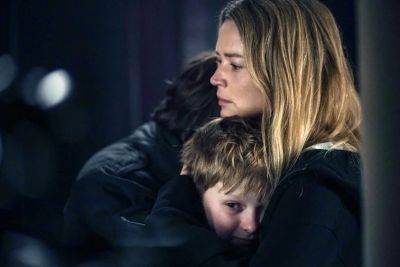
‘All to Play For’ Review: Virginie Efira Ignites a Vibrant, Enraging French Family Drama
Jessica Kiang Apparently determined to prove herself francophone cinema’s most inexhaustible precious resource, Virginie Efira once again lights up the screen prior to burning it down in a role that, after Justine Triet’s “Sibyl,” Paul Verhoeven’s “Benedetta” and Rebecca Zlotowski’s “Other People’s Children,” is of a type she has come to define: the strong-willed, smart fortysomething woman chafing against her society’s conformist expectations. Delphine Deloget’s debut “All to Play For” features one of Efira’s more straightforward incarnations of this dramatic type — fewer sly kinks, no arch winks. But she is no less riveting and lovely for it and in Deloget’s confident, gentle grip, she turns in one of her most committed performances, all the more moving for its commitment to valorizing the kind of woman seldom treated on screen with such respect and compassion.
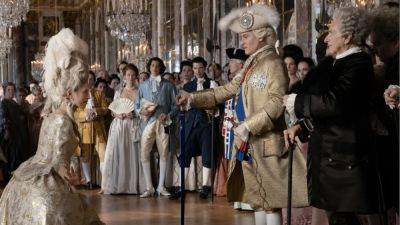
Johnny Depp’s Comeback Movie ‘Jeanne du Barry’ Rides High at French Box Office After Cannes Premiere
Elsa Keslassy International Correspondent After being greeted with a seven-minute standing ovation on opening night of the Cannes Film Festival, Johnny Depp’s comeback movie “Jeanne du Barry,” directed by Maiwenn, has charmed French audiences after debuting in cinemas. The costume drama, which stars Depp as the French King Louis XV and marks his first leading role in three years, has been having a strong run at the French B.O., proving that the controversial star is still bankable. At least in France. The film was widely released by Le Pacte on 650 screens and has grossed nearly $4.1 million from more than 550,000 tickets sold in two weeks, according to Comscore France. Currently playing across 800 screens, the film got mixed reviews in Cannes, but still has the potential of selling up to 850,000 tickets (an estimated $6.4 million), according to Eric Marti at Comscore France.
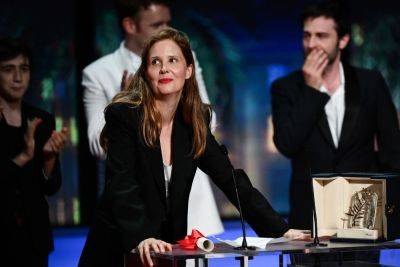
Escalating Row Over Cannes Palme D’Or Winner Justine Triet’s Politicized Victory Speech Spills Into French Parliament
The growing row around Cannes Palme d’Or winner Justine Triet’s politicized victory speech as she received the coveted award for courtroom drama Anatomy Of A Fall spilt into the French parliament on Tuesday.
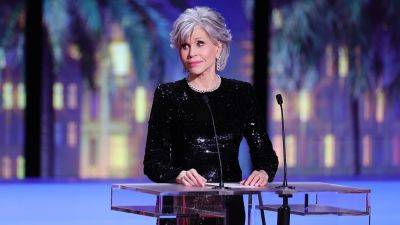
Jane Fonda Goes Viral for Throwing Palme d'Or Scroll at Director Justine Triet at the Cannes Film Festival
Jane Fonda took matters into her own hands over the weekend at the 2023 Cannes Film Festival. The 85-year-old veteran actress introduced the Palme d'Or Award to French director Justine Triet.Fonda introduced the historic moment, noting that seven female directors were nominated for the prestigious award for the first time and applauding the festival for its progress.She then gave Triet the award for her film.
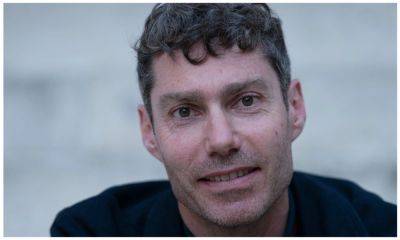
David Thion, Producer of Palme d’Or Winner ‘Anatomy of a Fall,’ Prepares Guillaume Senez’ Japan-Set ‘Une Part Manquante’ (EXCLUSIVE)
Elsa Keslassy International Correspondent David Thion, the French producer of Justine Triet’s Palme d’Or winning “Anatomy of a Fall,” is reteaming with Guillaume Senez for “Une part manquante,” a Tokyo-set drama which Be For Films is representing in international markets. “Une part manquante” will also reunite Senez with popular French actor Romain Duris, who starred in his 2018 film “Our Struggles” and earned a Cesar nomination for it. Brussels-based Be For Films had sold “Our Struggles” in most major territories and presented at a flurry of international festivals. Duris will play Jay, who hasn’t seen his daughter for nine years since getting separated from his Japanese wife. As a foreigner residing in Japan, Jay was denied custody of his daughter. Hoping to find her somewhere in the city, he abandons his career as a renown chef and becomes a taxi driver. After all these years searching in vain, Jay is about to give up and move back to France when Lily hops in his cab. But she doesn’t recognize him.
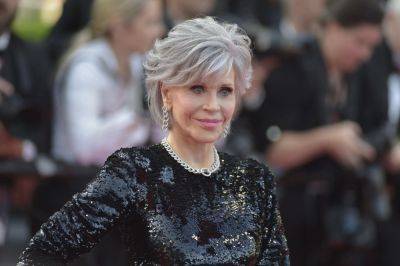
Jane Fonda Throws Award At Director Justine Triet After Trying, And Failing, To Get Her Attention At Cannes Film Festival
Jane Fonda found a way to get director Justine Triet’s attention after she left the stage without her award at the Cannes Film Festival over the weekend.

Palme d’Or Winning ‘Anatomy of a Fall’ Director Justine Triet Sparks Uproar in France with Fiery Political Speech
Elsa Keslassy International Correspondent The Cannes Film Festival managed to avoid pensions reform’s protests and a power cut during its entire duration, but Palme d’Or winning director Justine Triet made up for both with a fiery political speech that took aim at the French government. Her impassioned plea became instantly viral and has been dominating headlines in French media. After being introduced on stage by Jane Fonda and thanking her partners on the film and Cannes’ jury, Triet said the country “was rocked by an unprecedented protest movement that was extremely powerful and unanimous against the pensions reform.” She argued that the “protest was denied and suppressed in a shocking manner, and this pattern of increasingly uninhibited dominating power is now at work in several areas; obviously socially is where it is the most shocking, but we also see it in all spheres of society, and the film industry hasn’t been spared,” said Triet, drawing cheers and a few boos from the captive audience inside the Lumiere Theater.
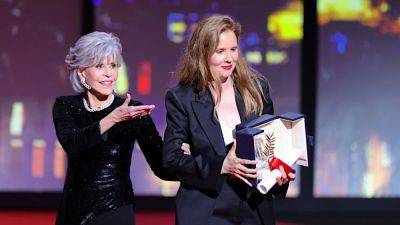
Watch Jane Fonda Hilariously Chuck Palme d’Or Certificate at Winner Justine Triet, Who Forgot to Take It (Video)
pic.twitter.com/6tv8TEj8zwFonda, an honorary Palme d’Or winner herself, presented Triet the prestigious award for her dramatic thriller film “Anatomy of a Fall” (“Anatomie d’une Chute”). In her speech, Fonda reflected on the first time she attended the French film festival many years ago.“There were no women directors competing at that time, and it never even occurred to us that there was something wrong with that,” Fonda said. “We have a long way to go.

Palme d’Or Whisperer Neon Makes It A Remarkable Four In A Row With ‘Anatomy Of A Fall’ — Cannes
Neon has continued its remarkable streak of consecutive Palme d’Or wins with English and French-language drama Anatomy Of A Fall.
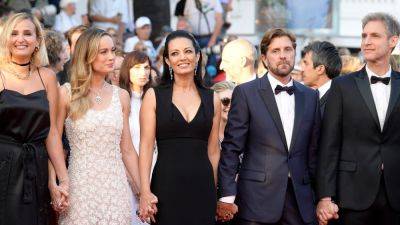
Cannes Jury Head Ruben Östlund On ‘Anatomy Of A Fall’ & The Awards Process: “The Palme d’Or Winner Was An Intense Experience — It’s What Cinema Should Be”
Cannes jury head has described the process of selecting the Competition winners as a “very intense experience”, at the jury press conference following the Palme d’Or victory for Justine Triet’s Anatomy Of A Fall. You can see the full list of winners here.
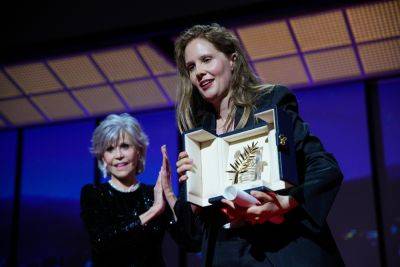
Cannes 2023: French Director Justine Triet’s ‘Anatomy Of A Fall’ Wins Palme d’Or
It’s a wrap for the 2023 edition of the Cannes Film Festival, where French director Justine Triet’s courtroom thriller “Anatomy of a Fall” has won this year’s Palme d’Or for best film.

12 Must-See Films From the Cannes Film Festival
Variety‘s critics pick the most notable dozen. Distributor: Neon One of seven women filmmakers in competition, Justine Triet has taken a familiar genre (the court- room drama) and turned it on its head. A frustrated writer dies of suspicious causes, leaving behind clues that implicate his wife (Sandra Hüller).

Film Sorority Girls Supports Girls Conquiers Cannes With Power Luncheon Hosted at Kering Venue
Elsa Keslassy International Correspondent Girls Supports Girls, the French film sorority launched by producer Vanessa Djian and publicist Karolyne Leibovici, made its debut at this year’s Cannes Film Festival with the backing of Orange, in association with Kering. A flurry of French female talent, notably “Simone” actress Elsa Zylberstein and “Houria” director Mounia Meddour, took part in the networking luncheon which was hosted on the rooftop terrasse of Kering’s Women in Motion event at the Majestic hotel. Djian, whose production banner Daïdaï Films recently became part of Newen Group, and Leibovici, the founder of A&K communication, launched Girls Supports Girls four years ago to connect and create opportunities for female producers, actresses, executives and diverse talent coming from the film, TV and media industries.

Wscripted Unveils Nominees for MUBI-Backed Cannes Screenplay List by Women and Non-Binary Writers
Elsa Keslassy International Correspondent Wscripted, the talent platform sourcing women and non-binary writers, has unveiled the nominees for its third Cannes Screenplay List, an initiative launched in partnership with MUBI. The final selection was curated by an inaugural jury of international female filmmakers, including Mounia Meddour (“Papicha”, “Houria”), Funa Maduka (“Waiting for Hassana”), and Camille Griffin (“Silent Night”). The list features 10 English-language and two French-language film projects by women and non-binary screenwriters and celebrates original projects from development to early financing stages.
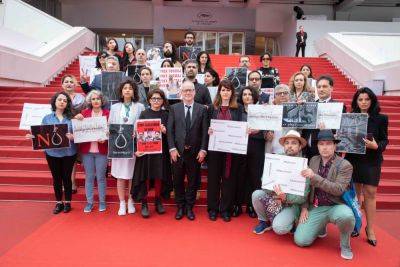
Zar Amir Ebrahimi, Milad Halami, Sepideh Farsi Discuss Censorship and Challenges for Diverse, Independent Iranian Cinema at Cannes Panel
Elsa Keslassy International Correspondent Leading lights of contemporary Iranian cinema, including ‘Holy Spider’ actor Zar Amir Ebrahimi, ‘The Siren’ director Sepideh Farsi, ‘The Opponent’ helmer Milad Alami and producer Kaveh Farnham, turned up at the Cannes Film Festival to raise the alarm on the repression faced by Iranian cinema during a session hosted by Amazon Prime Video’s Sahar Baghery. Iran has been the centerstage of widespread protests driven by women against the Islamic Regime since Mahsa Amini died in police custody for for wearing her hijab too loosely in September 2022. Although the rebellion has garnered vocal support outside of Iran, it hasn’t succeeded in dethroning the Iranian Regime. A number of dissident Iranian filmmakers and talent have been jailed over the last six months, notably Jafar Panahi and Mohammad Rasoulof who was recently released from prison. Rasoulof was nevertheless banned from leaving Iran to serve on the jury of Un Certain Regard at Cannes.

‘Anatomy Of A Fall’ Director Justine Triet Talks Love Of Cannes Competition: “It Can Be Violent” – Deadline Q & A
French director Justine Triet’s Anatomy Of A Fall premiered in Competition at Cannes over the weekend to a buzzy reception with its star Sandra Hüller being tipped as a front-runner for the festival’s coveted best actress prize.
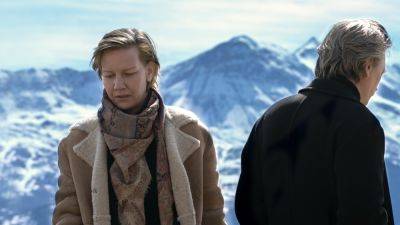
Neon Acquires Justine Triet’s Cannes Competition Feature ‘Anatomy Of A Fall’
Neon has acquired North American rights to Justine Triet’s Cannes Competition feature Anatomy of a Fall.
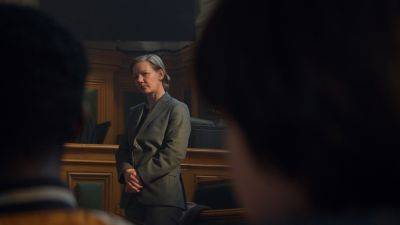
Neon Acquires Justine Triet’s Hitchcockian Courtroom Drama ‘Anatomy of a Fall’
Manori Ravindran Executive Editor of International Neon has acquired Justine Triet’s Hitchcockian courtroom drama “Anatomy of a Fall.” The U.S. distributor has been “aggressively pursuing” the competition title, which premiered in Cannes on Sunday to rapturous reviews, and has beat out competition. In the 150-minute film, a frustrated writer dies of suspicious causes, leaving behind clues that implicate his wife (Sandra Hüller) of his murder. Much of the film is focused on the ensuing trial, and features German star Hüller, known to international audiences for “Toni Erdmann,” delivering a powerhouse performance as a woman fighting to clear her name while protecting the couple’s young son. (Hüller previously teamed with Triet for psychological drama “Sibyl,” which also competed for the Palme d’Or at Cannes in 2019.)
